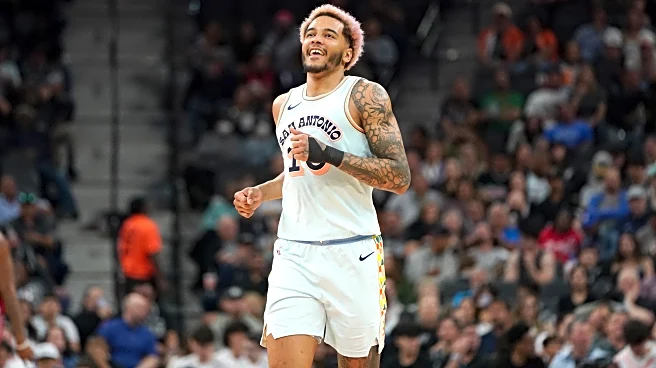The NBA season is approaching fast. The Spurs have largely finalized their offseason, signing 15 players to standard contracts and filling their three two-way spots. There might be some moves after training
camp, but they shouldn’t be major.
Only one major decision remains undecided, and could be a topic of conversation on media day on Monday. Jeremy Sochan is eligible for an extension but hasn’t signed one yet. There’s still time until the day before the regular season starts to come to an agreement, but there haven’t been reports about negotiations.
The Spurs may be just being secretive, but it’s also possible they are just simply being cautious and holding off on offering an extension at all. Let’s take a look at what the market value for Sochan might be, whether he’s done enough to earn an extension, and whether Brian Wright should give him one.
Non-stars don’t get paid much in rookie contract extensions after three seasons
In the past three years, Zion Williamson, Ja Morant, Darius Garland, Anthony Edwards, Tyrese Haliburton, LaMelo Ball, Cade Cunningham, Scottie Barnes, Evan Mobley, and Franz Wagner signed for the max. After those guys, the ones who signed for $30 million or more were Tyler Herro, Jordan Poole, Desmond Bane, R.J. Barrett, Jalen Suggs, Jalen Johnson, Jalen Green, and Alperen Sengun. It’s safe to say Sochan won’t be getting that type of deal, whether on an extension or free agency.
The players who got between $20 million and $29 million during that period were De’Andre Hunter, Kevin Porter Jr., Devin Vassell, Jaden McDaniels, and Trey Murphy III. This group is comprised of role players with plug-and-play skills and production who could outplay their salary if they make a leap or justify their contract if they just become good starters during their deals. The fact that only six guys have gotten $20 million+ extension in three years suggests that teams are hesitant to pay role guys before they have to. So far, more accomplished Sochan’s classmates Tari Eason and Keegan Murray, for example, have not signed an extension.
Every other one of the 11 rookies with three years of experience that signed an extension (Brandon Clarke, Nassir Little, Onyeka Okongwu, Deni Avdija, Josh Green, Cole Anthony, Aaron Nesmith, Zeke Naji, Payton Pritchard, Cory Kispert, and Jaden Hardy) did it for $15.5 million or less per year. They only got signed because they took very team-friendly deals instead of opting to wait for restricted free agency. This might be the group Sochan finds himself in based solely on his past play and not his upside.
The Spurs might want to see more before committing
Some of the reasons for concern about a Sochan extension are not his fault. First, injuries. Sochan played under 60 games in two of his three seasons. Last year, he was sidelined early, just as he was having a strong start, and this summer, he couldn’t raise his stock by competing in EuroBasket. Second, he’s spent some of his time on the ball at point guard, and some of it as a center on offense, as the Spurs experimented, in part out of necessity. So what exactly is Sochan, other than a great defender with an edge to him and a high motor? That question matters.
The aspect that could cause hesitation, which is a purely Sochan issue, is his jumper. Sochan shot well on two-pointers last season for the first time in his career, but his free-throw shooting took a dive, and his three-point shooting stagnated. Despite taking fewer long shots per possession and getting wide-open looks, Sochan shot 30.8 percent from beyond the arc, exactly the same as he did in 2023/24. His fit with Wembanyama improved because the big man became a more effective outside threat, but Sochan didn’t. He still presents similar issues to Josh Hart, for example, in that opponents can hide their center on him.
The injury woes, the unsuccessful role changes, and the lingering questions over whether he can eventually become a passable shooter that prevents opponents from loading up in the paint are reasonable concerns that could give the Spurs pause on any extension talks. Even for a team-friendly amount.
Restricted free agency gives the Spurs all the leverage
Sochan undoubtedly has his strengths. The question is, should the Spurs even offer an extension when they can simply wait another year before making a decision? There will be more cap room available next offseason, but the Spurs could match any salary sheet Sochan signs. The only risk in restricted free agency is another team making an absurd offer, but the market price for his type doesn’t seem high. Derrick Jones Jr. makes $10 million a year, looking like a reasonable baseline. Matisse Thybulle makes $11.5 million. Santi Aldama, who had to wait until after his fourth year, agreed to slightly above the mid-level exception, a reasonable ceiling.
As we’ve seen above, early extensions are mostly about keeping stars happy and finding bargains. A Sochan deal doesn’t accomplish the former, and only makes sense if it results in the latter. Additionally, teams have been using their leverage in restricted free agency more recently. The Spurs could find some middle ground with Sochan, just like they did with Keldon Johnson and Devin Vassell. But they don’t need to. He’ll likely be affordable next summer, and in the unlikely event that someone goes crazy with an offer sheet, they can keep him by matching it or let him go and focus on developing Carter Bryant.
Ideally, they’ll find some middle ground with a player that seems to bring a lot to the table that the numbers don’t always reflect, but no one could blame the front office for not being in a rush to potentially overpay Sochan when they are holding all the cards and could have some legitimate concerns about the charismatic forward’s future play and fit.









